仁爱版七年级英语下册《期末试卷》(附答案)
- 格式:doc
- 大小:2.00 MB
- 文档页数:7
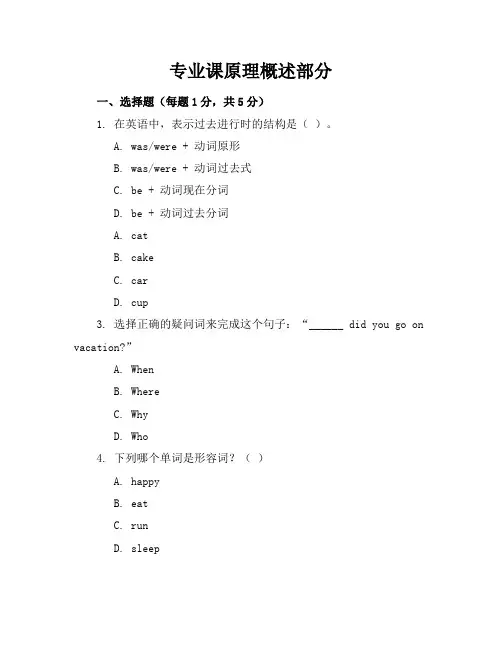
专业课原理概述部分一、选择题(每题1分,共5分)1. 在英语中,表示过去进行时的结构是()。
A. was/were + 动词原形B. was/were + 动词过去式C. be + 动词现在分词D. be + 动词过去分词A. catB. cakeC. carD. cup3. 选择正确的疑问词来完成这个句子:“______ did you go on vacation?”A. WhenB. WhereC. WhyD. Who4. 下列哪个单词是形容词?()A. happyB. eatC. runD. sleep5. “I ______ my homework every day.” 下列哪个词填空最合适?A. doB. doingC. didD. does二、判断题(每题1分,共5分)1. 英文句子的基本结构是主语+谓语+宾语。
()2. “ing”形式的动词可以用作形容词。
()3. 所有动词的过去式都是在其原形后加“ed”。
()4. “How old are you?”是询问对方年龄的正确方式。
()5. 英文中的疑问句总是以助动词或情态动词开头。
()三、填空题(每题1分,共5分)1. I ______ (be) a student.2. She ______ (go) to the park yesterday.3. They often ______ (play) soccer after school.4. My mother ______ (cook) dinner now.5. Can you help me ______ (find) my pen?四、简答题(每题2分,共10分)1. 请写出英语中一般现在时的构成。
2. 简述there be句型的用法。
3. 描述一下如何用英语询问时间。
4. 请举例说明什么是名词。
5. 解释一下什么是主语。
五、应用题(每题2分,共10分)1. 请将下列句子改为一般疑问句:“He reads a book every evening.”2. 用介词“in”填空:“I usually get up ______ the morning.”3. 请将下列句子改为否定句:“They can swim.”4. 请用“like”完成这个句子:“She ______ apples.”5. 请将下列句子改为过去进行时:“It rains.”六、分析题(每题5分,共10分)1. 分析下列句子的时态:“She will go to the library after school.”2. 请解释下列句子中划线词的词性及其在句中的作用:“Thesun sets in the west.”七、实践操作题(每题5分,共10分)1. 请用英语编写一个关于你上周末活动的对话。
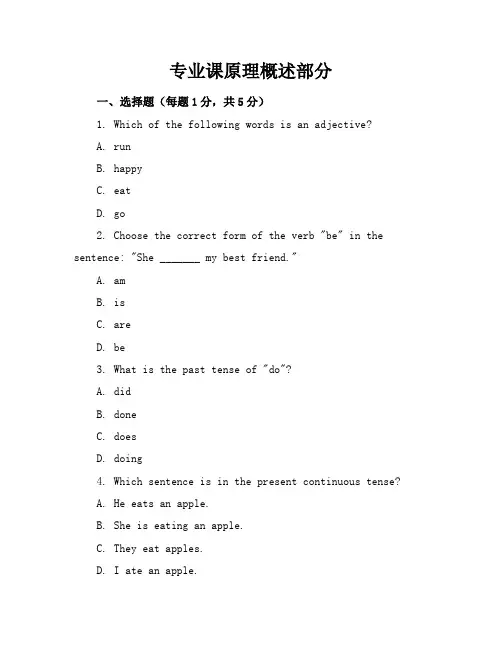
专业课原理概述部分一、选择题(每题1分,共5分)1. Which of the following words is an adjective?A. runB. happyC. eatD. go2. Choose the correct form of the verb "be" in the sentence: "She _______ my best friend."A. amB. isC. areD. be3. What is the past tense of "do"?A. didB. doneC. doesD. doing4. Which sentence is in the present continuous tense?A. He eats an apple.B. She is eating an apple.C. They eat apples.D. I ate an apple.5. What is the opposite of "expensive"?A. cheapB. costlyC. valuableD. price二、判断题(每题1分,共5分)6. "I am going to the library" is in the past tense. ( )7. "She can sing very well" is a statement. ( )8. "He doesn't like coffee" means "He likes coffee". ( )9. "They are playing football" shows a habitual action. ( )10. "Read a book" is an imperative sentence. ( )三、填空题(每题1分,共5分)11. The opposite of "hot" is _______.12. "I _______ a book every day" shows a habitual action.13. The plural form of "child" is _______.14. "She _______ to the cinema last night" is in the past tense.15. "_________ you like some tea?" is a question.四、简答题(每题2分,共10分)16. What is the difference between "I do" and "I am doing"?17. Write the past tense of "go".18. What is the present perfect tense used for?19. Give an example of an adverb.20. How do you form the plural of regular nouns?五、应用题(每题2分,共10分)21. Rewrite the sentence in the past tense: "She buys a new dress every month."22. Change the sentence into a question: "He is reading a newspaper."23. Fill in the correct form of "be": "They _______ students."24. Correct the sentence: "He go to school bus."25. Write a sentence using the present continuous tense.六、分析题(每题5分,共10分)26. Compare and contrast the simple present and present continuous tense.27. Explain the difference between "I like to eat apples" and "I like eating apples."七、实践操作题(每题5分,共10分)28. Write a short dialogue between two friends discussing their hobbies.29. Create a story using at least 5 different tenses.八、专业设计题(每题2分,共10分)30. Design a classroom activity to practice the past simple tense.31. Create a worksheet for students to practice forming questions in English.32. Outline a roleplay scenario for practicing daily conversations at a restaurant.34. Plan a vocabulary building game for new adjectives.九、概念解释题(每题2分,共10分)35. Explain the concept of direct and indirect objects.36. Define the term "phrasal verb" and give an example.37. Describe the difference between "affect" and "effect."38. What is a gerund and how is it used in a sentence?39. Explain the use of the articles "a," "an," and "the."十、思考题(每题2分,共10分)40. How can you teach the difference between "too," "two," and "to" effectively?41. What strategies can be used to help students remember new vocabulary?42. Why is it important to teach idiomatic expressions in English language learning?43. How can technology be integrated into an English language classroom?44. Discuss the benefits of using authentic materials in language teaching.十一、社会扩展题(每题3分,共15分)45. How does learning English benefit students in a globalized world?47. What are the challenges faced nonnative English speakers in academic settings?48. How can cultural differences impact the teaching and learning of English?49. Analyze the influence of social media on the evolution of the English language.一、选择题答案1. B2. B3. A4. B5. A二、判断题答案6. ×7. √8. ×9. ×10. √三、填空题答案11. cold12. read13. children14. went15. Would四、简答题答案16. "I do" refers to a general action or habit, while "I am doing" refers to an action happening now.17. went18. The present perfect tense is used to talk about actions that happened at an unspecified time before now or actions that started in the past and continue to the present.19. quickly20. Regular nouns form their plurals adding s or es to the singular form.五、应用题答案21. She bought a new dress last month.22. Is he reading a newspaper?23. are24. He goes to school bus.25. She is watching TV.六、分析题答案26. The simple present tense is used for actions that are general truths, habits, or occur regularly. The present continuous tense is used for actions happening now or around now. Example: "I drink coffee every morning" (simple present) vs. "I am drinking coffee right now" (present continuous).27. "I like to eat apples" suggests a general preference, while "I like eating apples" suggests enjoyment of the action itself.七、实践操作题答案28. See example dialogue below:A: Hi, Tom! What do you like to do in your free time?B: Hi, Lisa! I love playing soccer. How about you?A: I enjoy reading books, especially mystery novels.B: That sounds interesting. Maybe we can read together sometime.29. See example story below:Every morning, I wake up at 7 o'clock. I get dressed and eat breakfast. Right now, I am eating toast and drinking orange juice. Yesterday, I went to the park with my friends. We played soccer and had a great time. Next week, we plan to go to the movies.1. 语法知识:时态:简单现在时、现在进行时、过去简单时动词形式:动词原形、过去式、现在分词名词复数:规则名词复数形式的构成形容词和副词:形容词的用法、副词的构成疑问句:一般疑问句的构成指示词:冠词的用法2. 词汇知识:词性:名词、动词、形容词、副词常用短语:如 "go to the movies," "play soccer"反义词:如 "hot" 和 "cold"3. 读写技能:阅读理解:通过阅读材料回答问题写作技能:编写对话和故事4. 听说技能:对话理解:理解日常对话内容口语表达:能够进行简单的日常交流各题型知识点详解及示例:选择题:考察学生对英语基础语法和词汇知识的掌握。
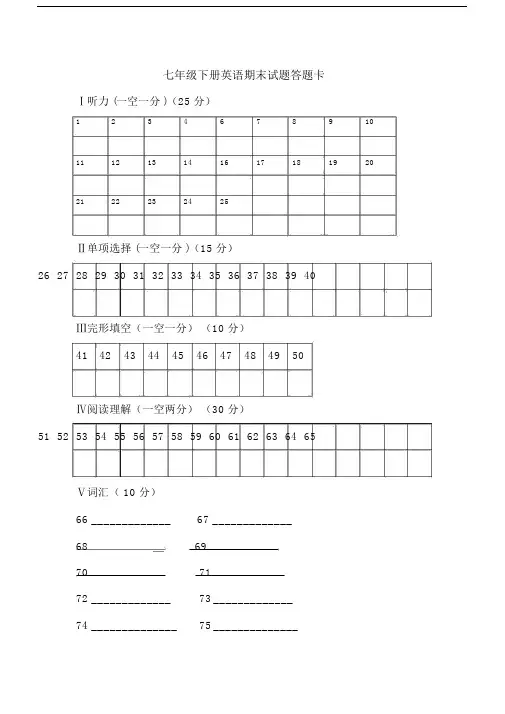
七年级下册英语期末试题答题卡Ⅰ听力 (一空一分 )(25 分)12346789101112131416171819202122232425Ⅱ单项选择 (一空一分 )(15 分)26 27 28 29 30 31 32 33 34 35 36 37 38 3940Ⅲ完形填空(一空一分)(10 分)41 42 43 44 45 46 47 48 4950Ⅳ阅读理解(一空两分)(30 分)51 52 53 54 55 56 57 58 59 60 61 62 63 6465Ⅴ词汇( 10 分)66 _____________ 67 _____________68 _6970 7172 _____________ 73 _____________74 ______________ 75 ______________Ⅵ八情景交际( 5 分)7677787980Ⅶ九句型转换( 10)_____________________________________________________ 81._______________8 2._______________ 83._____________84_____________85________ _______Ⅷ书面表达(15 分)(A)__________________________________________________________________________________________________________________________________________________________________________________________________________________________________________________________________________________ (B) __________________________________________________ _______________________________________________________ _______________________________________________________ _______________________________________________________ _______________________________________________________ _______________________________________________________ _______________________________________________________ _______________________________________________________ ____________________________________________七年级下册期末试卷(考试时间: 90 分钟,满分: 120 分)第一部分:听力部分( 25 分)Ⅰ.听句子,选择正确图片,其中有一幅是多余的。
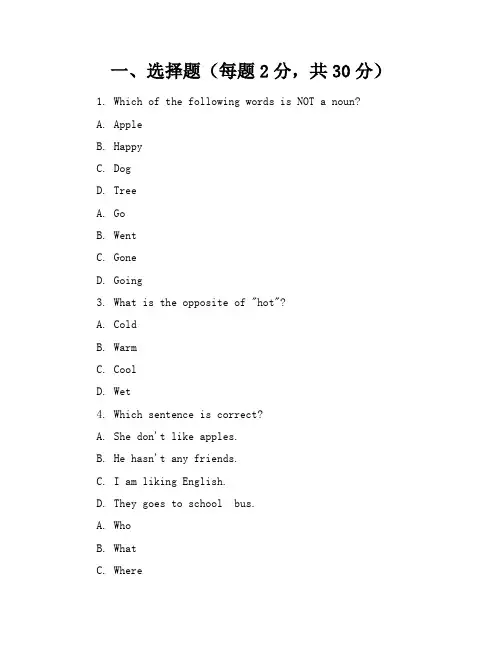
一、选择题(每题2分,共30分)1. Which of the following words is NOT a noun?A. AppleB. HappyC. DogD. TreeA. GoB. WentC. GoneD. Going3. What is the opposite of "hot"?A. ColdB. WarmC. CoolD. Wet4. Which sentence is correct?A. She don't like apples.B. He hasn't any friends.C. I am liking English.D. They goes to school bus.A. WhoB. WhatC. WhereD. Why6. Which word means "not often"?A. AlwaysB. SometimesC. NeverD. OftenA. GoB. GoesC. GoingD. Went二、判断题(每题1分,共20分)1. Apples are a type of fruit. ( )2. The sun sets in the east. ( )3. There are seven days in a week. ( )4. He goes to school car. ( )5. She can speak French. ( )6. The cat is sleeping on the table. ( )7. He is watching TV in his room. ( )8. She is reading a book. ( )9. It is snowing outside. ( )10. He has two brothers. ( )11. She is wearing a red dress. ( )12. The store is closed on Sundays. ( )13. He is playing soccer with his friends. ( )14. She is cooking dinner. ( )15. The dog is barking loudly. ( )16. He is eating an apple. ( )17. She is writing a letter. ( )18. The cat is chasing a mouse. ( )19. He is sleeping on the couch. ( )20. She is washing the dishes. ( )三、填空题(每空1分,共10分)1. I ______ to the park yesterday.2. She ______ a book every evening.3. They ______ to the movies last week.4. He ______ his homework in the afternoon.5. We ______ a cake for dessert.6. You ______ the door before you leave.7. They ______ their rooms every weekend.8. She ______ a letter to her friend.9. He ______ his bike to school.10. I ______ the dishes after dinner.四、简答题(每题10分,共10分)1. Describe your favorite hob and explain why you enjoy it.2. If you could travel anywhere in the world, where would you go and why?五、综合题(1和2两题7分,3和4两题8分,共30分)1. Write a short story about a magic pen that can bring drawings to life.2. Describe your ideal vacation and explain why it would be perfect for you.3. Create a dialogue between two friends discussing their favorite movies.4. Explain the importance of learning a second language and how it can benefit your future.(考试时间:90分钟,满分:100分)一、选择题(每题2分,共30分)1. Which of the following words is NOT a noun?A. AppleB. HappyC. DogD. TreeA. GoB. WentC. GoneD. Going3. What is the opposite of "hot"?A. ColdB. WarmC. CoolD. Wet4. Which sentence is correct?A. She don't like apples.B. He hasn't any friends.C. I am liking English.D. They goes to school bus.A. WhoB. WhatC. WhereD. Why6. Which word means "not often"?A. AlwaysB. SometimesC. NeverD. OftenA. GoB. GoesC. GoingD. Went二、判断题(每题1分,共20分)1. Apples are a type of fruit. ( )2. The sun sets in the east. ( )3. There are seven days in a week. ( )4. He goes to school car. ( )5. She can speak French. ( )6. The cat is sleeping on the table. ( )7. He is watching TV in his room. ( )8. She is reading a book. ( )9. It is snowing outside. ( )10. He has two brothers. ( )11. She is wearing a red dress. ( )12. The store is closed on Sundays. ( )13. He is playing soccer with his friends. ( )14. She is cooking dinner. ( )15. The dog is barking loudly. ( )16. He is eating an apple. ( )17. She is writing a letter. ( )18. The cat is chasing a mouse. ( )19. He is sleeping on the couch. ( )20. She is washing the dishes. ( )三、填空题(每空1分,共10分)1. I ______ to the park yesterday.2. She ______ a book every evening.3. They ______ to the movies last week.4. He ______ his homework in the afternoon.5. We ______ a cake for dessert.6. You ______ the door before you leave.7. They ______ their rooms every weekend.8. She ______ a letter to her friend.9. He ______ his bike to school.10. I ______ the dishes after dinner.四、简答题(每题10分,共10分)1. Describe your favorite hob and explain why you enjoy it.2. If you could travel anywhere in the world, where would you go and why?五、综合题(1和2两题7分,3和4两题8分,共30分)1. Write a short story about a magic pen that can bring drawings to life.2. Describe your ideal vacation and explain why it would be perfect for you.3. Create a dialogue between two friends discussing their favorite movies.4. Explain the importance of learning a second language and how it can benefit your future.一、选择题答案1. B2. B3. A4. B5. B6. C7. B二、判断题答案1. √2. ×3. √4. √5. ×6. √7. √8. √9. ×10. √11. √12. √13. √14. √15. √16. √17. √18. √19. √20. √三、填空题答案1. went2. reads3. went4. does5. had6. lock7. clean8. wrote9. rides10. did四、简答题答案1. 略2. 略五、综合题答案1. 略2. 略3. 略4. 略一、选择题本题型主要考察学生对英语词汇、语法和句型的理解和运用能力。
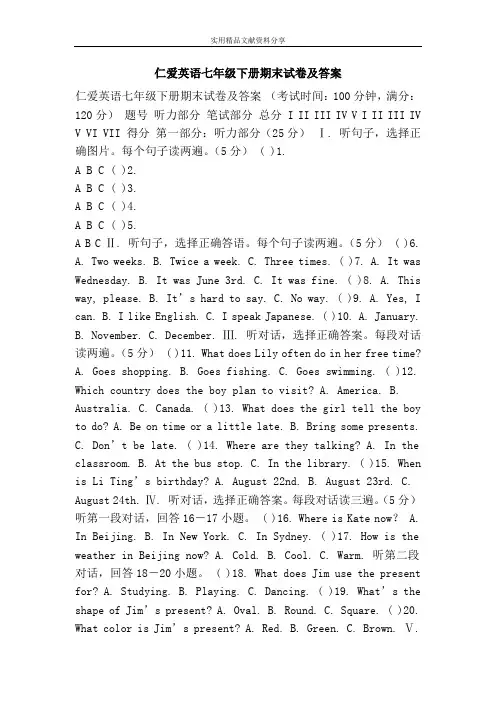
仁爱英语七年级下册期末试卷及答案仁爱英语七年级下册期末试卷及答案(考试时间:100分钟,满分:120分)题号听力部分笔试部分总分 I II III IV V I II III IV V VI VII 得分第一部分:听力部分(25分)Ⅰ. 听句子,选择正确图片。
每个句子读两遍。
(5分) ( )1.A B C ( )2.A B C ( )3.A B C ( )4.A B C ( )5.A B C Ⅱ. 听句子,选择正确答语。
每个句子读两遍。
(5分) ( )6.A. Two weeks.B. Twice a week.C. Three times. ( )7. A. It was Wednesday. B. It was June 3rd. C. It was fine. ( )8. A. This way, please. B. It’s hard to say. C. No way. ( )9. A. Yes, I can. B. I like English. C. I speak Japanese. ( )10. A. January.B. November.C. December. Ⅲ. 听对话,选择正确答案。
每段对话读两遍。
(5分) ( )11. What does Lily often do in her free time?A. Goes shopping.B. Goes fishing.C. Goes swimming. ( )12. Which country does the boy plan to visit? A. America. B. Australia. C. Canada. ( )13. What does the girl tell the boy to do? A. Be on time or a little late. B. Bring some presents.C. Don’t be late. ( )14. Where are they talking? A. In the classroom. B. At the bus stop. C. In the library. ( )15. When is Li Ting’s bir thday? A. August 22nd. B. August 23rd. C. August 24th. Ⅳ. 听对话,选择正确答案。
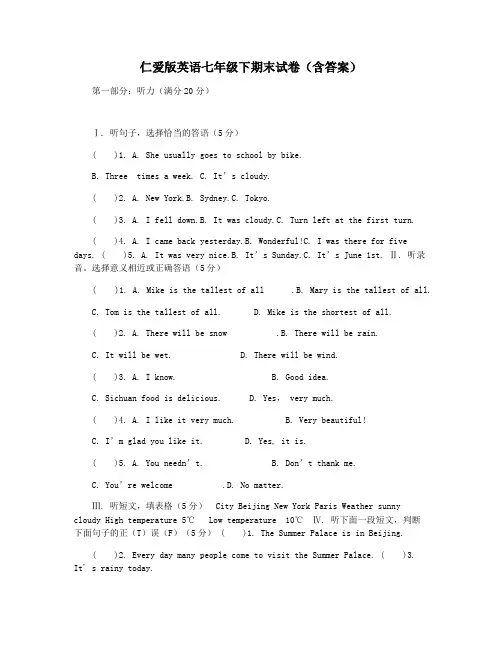
仁爱版英语七年级下期末试卷(含答案)第一部分:听力(满分20分)Ⅰ. 听句子,选择恰当的答语(5分)( )1. A. She usually goes to school by bike.B. Three times a week.C. It’s cloudy.( )2. A. New York.B. Sydney.C. Tokyo.( )3. A. I fell down.B. It was cloudy.C. Turn left at the first turn.( )4. A. I came back yesterday.B. Wonderful!C. I was there for five days. ( )5. A. It was very nice.B. It’s Sunday.C. It’s June 1st. Ⅱ. 听录音。
选择意义相近或正确答语(5分)( )1. A. Mike is the tallest of all .B. Mary is the tallest of all.C. Tom is the tallest of all.D. Mike is the shortest of all.( )2. A. There will be snow .B. There will be rain.C. It will be wet.D. There will be wind.( )3. A. I know. B. Good idea.C. Sichuan food is delicious.D. Yes, very much.( )4. A. I like it very much. B. Very beautiful!C. I’m glad you like it.D. Yes, it is.( )5. A. You needn’t. B. Don’t thank me.C. You’re welcome .D. No matter.Ⅲ. 听短文,填表格(5分) City Beijing New York Paris Weather sunny cloudy High temperature 5℃ Low temperature 10℃ Ⅳ. 听下面一段短文,判断下面句子的正(T)误(F)(5分) ( )1. The Summer Palace is in Beijing.( )2. Every day many people come to visit the Summer Palace. ( )3.It' s rainy today.( )4. Li Hong visits the Summer Palace on Sunday. ( )5. There are twenty-three students in her class.第二部分:笔试(满分100分)Ⅰ. 单项选择(15分)( )1. ―Where do you come from?―________A. Yes I do.B. I’m a student.C. I come from Canada.D. It’s very nice.( )2. ―How do you usually go to school?―________A. By a bus.B. On foot.C. On bike.D. with car( )3. ――The kitchen fan doesn’t work.A. What’s that?B. What’s the matter?C. Can I help you?D. How are you?( )4. Mike was born a hot summer evening.A. atB. onC. inD. of( )5. ―Excuse me. Could you tell me the way to the hospital?―A. You can’t miss it.B. I don’t know.C. No, I don’t know.D. I’m sorry, I’m new here myself.( )6. The plane will leave at .A. a quarter to elevenB. eleven a quarterC. eleven past aquarter D. quarter( )7. ―What’s the matter with your leg?―I yesterday.A. fell aboutB. fell downC. fell overD. broke down( )8. Last Saturday, we made the cards hand.A. of B about C. by D. with( )9. The local people were very .A. friendB. friendlyC. fineD. expensive( )10. ―Happy New Year!―_______A. It’s OK.B. The same to you!C. Yes.D. Happy birthday!( )11. He is sitting the classroom.A. at the frontB. in the front ofC. in frontD. in front of( )12. It was very different ours.A. ofB. aboutC. fromD. for( )13. ―How was the weather yesterday?―It was .A. sunB. rainC. snowD. cloudy( )14. ―Is there a shop around here?―A. Yes, it is .B. Yes, that is .C. Yes, there is.D. No, there is.( )15. Go straight ahead and turn right the second turn.A. onB. inC. atD. ofⅡ. 连词成句(5分)1. is computer he games playing_________________________________________________________ 2. play at I the can guitar party the_________________________________________________________ 3. season in is which the year the warmest_________________________________________________________ 4. point anything to foot mustn’t with your you_____________________________________________________________ 5. time hope you I all a have good______________________________________________________________ Ⅲ.句型转换(5分)1. Aunt Zhu lives in the building next to my house.(划线部分提问) ____does Aunt Zhu ______?2. My favorite food is hot dog.(改成同义句) I ______ hot dog ______.3. They know about him very mueh.(改成同义句) They know about him __________.4. There are four books on the table.(对划线部分提问) _____ _____ books _____ _____ on the table?5. We should return the books to the library on time.(改成同义句) We should _____ _____ the books to the library on time. Ⅳ. 句子排序组成对话(10分)A. Sorry. I don’t know. You can go and ask the policeman.B. You can’t miss it.C. Thank you anyway.D. Excuse me, Do you know the way to Tian An Men Square?E. First. You need to take the No.47 bus and then you can change to the NO.22 bus at Xidan.F. Excuse me. Could you tell me the way to Tian An Men Square? Ⅴ. 根据首字母,汉语意思提示完成句子(10分)1. Do you often read books in the l ______ ?2. There is a store in front of our b. ______ ?3. I can d ______ ballet.4. Mike and Mary came to Kangkang’s home to c ______ his birthday.5. I will go to Hainan for my summer h______ .6. Did you r ______ a Chinese poemat the party? 7. My favorite s ______ is winter. 8. What’s the w______ like today?9. I am going to t ______ to some places of interest.10. In the Spring F____ , Chinese people make dumpling and perform lionand dragon dances. Ⅵ. 完形填空(10分)April 14th is my grandmother’s birthday. I’ll go back to my hometown 1my parents. Yesterday, after supper our family had a 2 . “What 3 we buy for grandmother next week?” I asked. “We can buy her a shirt.” said my brother. “My sister 4 me yesterday. She told me. she would buy clothers for grandmother.” my mother said,“We can buy her a big 5 .”My sister-in-law(嫂子)told me she wou ld prepare the birthday 6 .“Dad, what shall we buy them?”I asked. “I don’t know 7 ” answered my father. We thought 8 . “I know.” I shouted(喊), “We can buy 9 some milk powder(奶粉)!”“Why?”“Grandma is very 10 . If we buy her some milk powder, she will get the calcium(钙) she needs after drinking it. ( )1. A. and B. with C. for D. at ( )2. A. party B. meeting C. yest D. look ( )3. A. do B. would C. may D. shall( )4. A. called B. took C. said D. made ( )5. A. pear B. apple C. cake D. orange ( )6. A. suit B. dinner C.supper D. play( )7. A. buy B. to buy C. how to buy D. what to buy( )8.A.hard B. of C. about D. over ( )9.A.she B. hers C. her D. us ( )10.A.strong B. old C. tall D. think Ⅶ.阅读理解(15分)AJimmy lived in the country, and he loved playing in a very shallow(浅的)river near his house;but then his father got a job in a big city, and he moved there with his family.Their new house had a garden, but the garden was very small. Jimmy wasn’t ve ry happy. “Is there a river near here?” he asked his mother on the first morning.His mother answered,“ No, there isn’t, but there’s a beautiful parknear here, Jimmy, and there’s a pool in it. We’ll go there this afternoon.” Then Jimmy was happy.After lunch, Jimmy and his mother went to the park, Jimmy wanted to walk near the pool, but there was a sign in front of it. His mother read it tohim:“WARNING: This pool is dangerous.(危险的)367 people have fallen intoit.”Jimmy looked into the pool carefully. Then he said,“I can’t see them.”根据短文内容判断正(T)误(F)()1.Jimmy’s father worked in a big city.()2.After breakfast, Jimmy and his mother went to the park. ()3.The garden was very small. ()4.There’s a pool in the country.()5.367 people have fallen into the pool.BWe drink tea every day. But more than 400 years ago, most people inEurope(欧洲) did not know anything about tea. Some had heard about it ,butvery few knew what to do with it.Here is a story about an English sailor(水手)who went to countries all over the world. He had been to China and India. One day he came home andbrought some tea as a present for his mother. She told her friends about the present and invited them to a “tea party”.When her friends came to the “tea party”,the old woman gave them brown tea leaves. Her friends began to eatthem of course, nobody liked the tea leaves. At that moment the sailor camein ,he looked at the table and said,“Mother, what have you done with the tea?” “I boiled it, as you said.”“And what have you done with the water?”“I poured it out, of course.”answered the mother.“Now you may throw away the leaves.”said the sailor. 1. Themother_________.A. boiled the tea and threw the leaves awayB. boiled the tea and pouredthe water out C. knew more about tea than others D. enjoyed herself very much2. At the “tea party\A. everybody enjoyed the brown tea leavesB. some of her friends enjoyed the brown tea leavesC. nobody enjoyed the brown tea leavesD. the old woman enjoyed the brown tea leaves3. The son asked his mother to throw away the leaves, because__________. A. his mother had treated (招待)her friends with the wrong thing B. the tea his mother has made was t oo strong C. he didn’t like his mother’s friends D. he himself didn’t like the tea leaves4. Where does the sailor come from?.A. AmericaB. CanadaC. ThailandD. England 5.He had been to.A. China and AustraliaB. Brazil and ChileC. China and BrazilD. India and ChinaCIt was a Saturday morning in May. When Mrs Edwards opened her curtains (窗帘)and looked out, she smiled and said,“It’s going to be a beautifulday.”She woke(唤醒) her small son up at eight-thirty and said to him,“Get up,Teddy. We’re going to go to the zoo today. Wash your hands and face,brushyour teeth and eat your breakfast quickly. We’re going to go to New York by train.” Teddy was six years old. He was very happy now, because he liked going to the zoo very m uch, and he also liked going by train. He said,“I dreamed about the zoo last night, Mommy.” His mother was in a hurry, but she stopped and smiled at her small son.“You did, Teddy?”she said.“And what did you do in the zoo in your dream?”Teddy laughed a nd answered,“You know, Mommy! You were there in my dream too.”Answer these questions:1.What did Mrs. Edwards say when she looked out of the window?2.Why was Teddy happy?3.What did Teddy dream about?4.What did Mrs. Edwards ask Teddy?5.What did Teddy answer?Ⅷ.补全对话。
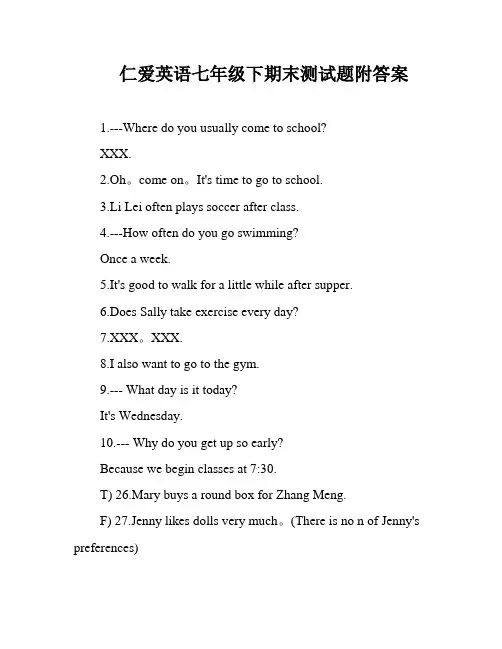
仁爱英语七年级下期末测试题附答案1.---Where do you usually come to school?XXX.2.Oh。
come on。
It's time to go to school.3.Li Lei often plays soccer after class.4.---How often do you go swimming?Once a week.5.It's good to walk for a little while after supper.6.Does Sally take exercise every day?7.XXX。
XXX.8.I also want to go to the gym.9.--- What day is it today?It's Wednesday.10.--- Why do you get up so early?Because we begin classes at 7:30.T) 26.Mary buys a round box for Zhang Meng.F) 27.Jenny likes dolls very much。
(There is no n of Jenny's preferences)F) 28.XXX for Zhang Meng。
(There is no n of what Mary buys for Zhang Meng)F) 29.Jenny buys a doll for herself。
(There is no n of Jenny buying anything)T) 30.Jenny’s present is a secret.A young man and an old man were waiting for a train at a n。
They sat next to each other。
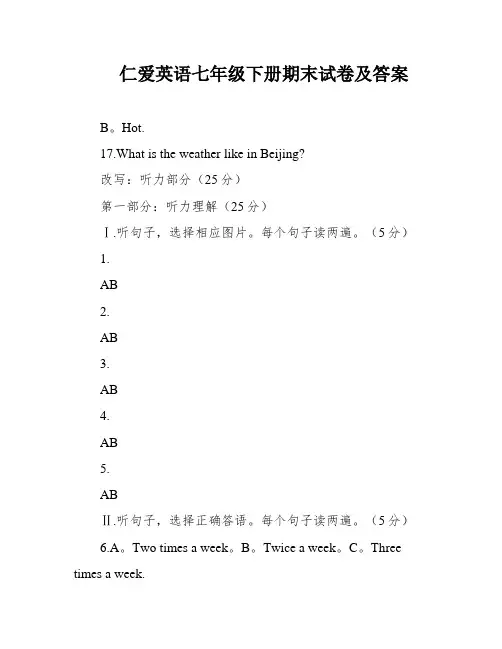
仁爱英语七年级下册期末试卷及答案B。
Hot.17.What is the weather like in Beijing?改写:听力部分(25分)第一部分:听力理解(25分)Ⅰ.听句子,选择相应图片。
每个句子读两遍。
(5分)1.AB2.AB3.AB4.AB5.ABⅡ.听句子,选择正确答语。
每个句子读两遍。
(5分)6.A。
Two times a week。
B。
Twice a week。
C。
Three times a week.7.A。
It was Wednesday。
B。
It was June 3rd。
C。
It was fine.8.A。
This way。
please。
B。
It’s hard to say。
C。
No way.9.A。
Yes。
I can。
B。
I like English。
C。
I speak Japanese.XXX.Ⅲ.听对话,选择正确答案。
每段对话读两遍。
(5分)11.Lily often does what in her free time?A。
XXX.12.Which country does the boy plan to visit?A。
XXX.13.What does the girl tell the boy to do?A。
Be on time or a little XXX.14.Where are they talking?A。
In the classroom.15.When is Li Ting’s birthday?A。
August 22nd.听第一段对话,回答16—17小题。
16.Where is Kate currently located?A。
In Beijing。
B。
In New York.17.What is the weather like in Beijing?A。
Cold。
B。
Hot.There is a big TV in the living room。
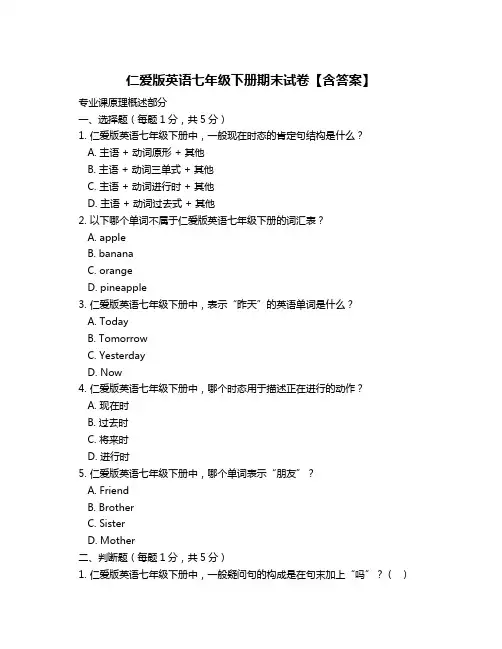
仁爱版英语七年级下册期末试卷【含答案】专业课原理概述部分一、选择题(每题1分,共5分)1. 仁爱版英语七年级下册中,一般现在时态的肯定句结构是什么?A. 主语 + 动词原形 + 其他B. 主语 + 动词三单式 + 其他C. 主语 + 动词进行时 + 其他D. 主语 + 动词过去式 + 其他2. 以下哪个单词不属于仁爱版英语七年级下册的词汇表?A. appleB. bananaC. orangeD. pineapple3. 仁爱版英语七年级下册中,表示“昨天”的英语单词是什么?A. TodayB. TomorrowC. YesterdayD. Now4. 仁爱版英语七年级下册中,哪个时态用于描述正在进行的动作?A. 现在时B. 过去时C. 将来时D. 进行时5. 仁爱版英语七年级下册中,哪个单词表示“朋友”?A. FriendB. BrotherC. SisterD. Mother二、判断题(每题1分,共5分)1. 仁爱版英语七年级下册中,一般疑问句的构成是在句末加上“吗”?()2. 仁爱版英语七年级下册中,动词“be”的三单式是“is”?()3. 仁爱版英语七年级下册中,表示“喜欢”的英语单词是“love”?()4. 仁爱版英语七年级下册中,基数词“20”的英语表达是“twenty”?()5. 仁爱版英语七年级下册中,一般将来时态的构成是在动词原形前加上“will”?()三、填空题(每题1分,共5分)1. 仁爱版英语七年级下册中,表示“去”的英语单词是______。
2. 仁爱版英语七年级下册中,表示“学校”的英语单词是______。
3. 仁爱版英语七年级下册中,表示“早上”的英语单词是______。
4. 仁爱版英语七年级下册中,表示“工作”的英语单词是______。
5. 仁爱版英语七年级下册中,表示“快乐”的英语单词是______。
四、简答题(每题2分,共10分)1. 请简述仁爱版英语七年级下册中一般过去时态的构成。
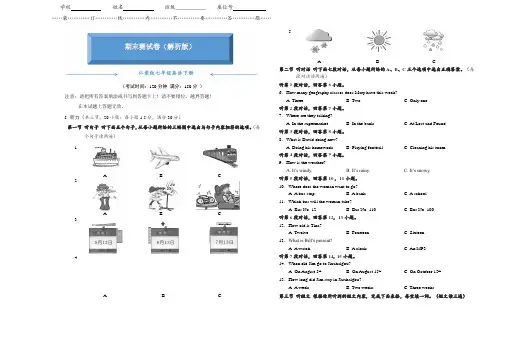
(考试时间:120分钟满分:150分)注意:请把所有答案填涂或书写到答题卡上!请不要错位、越界答题!在本试题上答题无效。
I.听力(共三节,20小题; 每小题1.5分,满分30分)第一节听句子听下面五个句子,从每小题所给的三幅图中选出与句子内容相符的选项。
(每个句子读两遍)1.A B C2.A B C3.A B C4.A B C5.AA B C第二节听对话听下面七段对话,从每小题所给的A、B、C三个选项中选出正确答案。
(每段对话读两遍)听第1段对话,回答第6小题。
6.How many geography classes does Mary have this week?A. Three.B. Two.C. Only one.听第2段对话,回答第7小题。
7.Where are they talking?A. In the supermarket.B. In the bank.C. At Lost and Found.听第3段对话,回答第8小题。
8.What is David doing now?A. Doing his homework.B. Playing football.C. Cleaning his room.听第4段对话,回答第9小题。
9.How is the weather?A. It’s windy.B. It’s rainy.C. It’s snowy.听第5段对话,回答第10 , 11小题。
10.Where does the woman want to go?A. A bus stop.B. A bank.C. A school.11.Which bus will the woman take?A. Bus No. 12.B. Bus No. 110.C. Bus No. 100.听第6段对话,回答第12, 13小题。
12.How old is Tina?A. Twelve.B. Fourteen.C. Sixteen.13.What is Bill’s present?A. A watch.B. A clock.C. An MP3.听第7段对话,回答第14, 15小题。
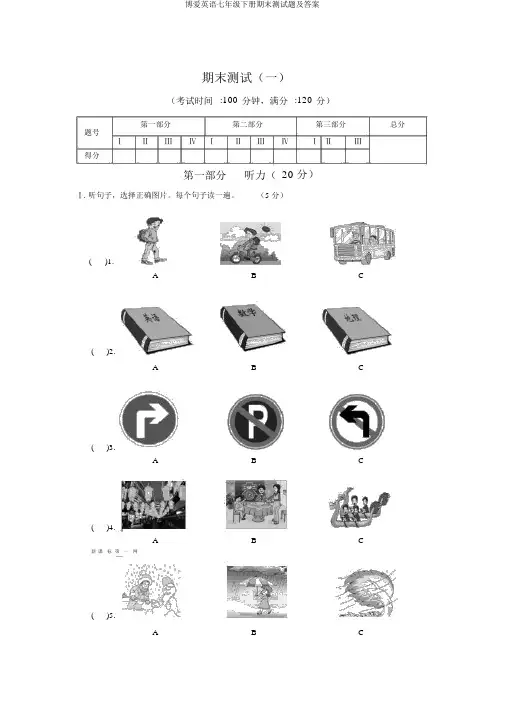
期末测试(一)(考试时间:100 分钟,满分:120 分)第一部分第二部分第三部分总分题号ⅠⅡⅢⅣⅠⅡⅢⅣⅠⅡⅢ得分第一部分听力(20 分)Ⅰ. 听句子,选择正确图片。
每个句子读一遍。
(5 分)()1.A B C()2.A B C()3.A B C()4.A B C新-课 - 标 -第 -一 -网()5.A B CⅡ. 听句子,选择正确答语。
每个句子读一遍。
(5 分)( )6. A. Fine, thank you. And you ? B. I ’m doing my homework.C. I ’m making the card by hand.( )7. A. Thank you all the same. B. This way, please.C. I don’ttell you.( )8. A. It ’s hard to say. B. Yes, I like it best.C. No, I don ’tlike it.( )9. A. I can write. B. I can draw a bird. C. Yes, I can.( )10. A. It ’s Wednesday. B. It was Friday. C. It was June 3rd. Ⅲ. 听对话,选择正确答案。
每段对话读两遍。
(5分)()11. What does Jane often do in her free time? 新课标第一网A. She often watches TV.B. She often dances to music.C. A and B.()12. What ’s the boy’s plan for the summer holidays?A. He wants to visit Germany.B. He hopes to visit India.C. He would like to go to Australia.()13. What shape is Maria ’s present?A. It ’s black and white.B. It ’s round.C. We don’tknow.()14. Where are they talking?A. In a restaurant.B. In a store.C. In a library.()15. Are there any model planes in the box ?A. Yes, there are.B. No, there aren ’t.C. Yes, there is only one.Ⅳ. 听短文,选择正确答案。
最新仁爱版英语七年级下册期末试题(含答案和答题卡)Part One: Listening (25 points)XXX and choose the correct picture。
One picture is extra。
The sentence will be read twice。
(5 points)a b cd e f1 2 3 4 5XXX(5 points)6.A: Do you usually go to school by bus?B: By bus.A: Yes。
I do.7.A: What is your favourite subject?B: English.A: XXX.8.A: Is there a park near here?B: Yes。
there is.A: Is it big?9.A: What does she do?B: She goes to work on foot.A: Does she work in a school?10.A: Can you help me with my homework? B: Good idea!A: Thank you.XXX(5 points)11.How often does the girl have Chinese food? A: Very often.B: Seldom.C: Every day.12.Does the man know the way to the zoo? A: Yes。
he does.B: No。
he doesn't.C: We don't know.13.What time does the girl have supper?A: 7:30.B: 7:20.C: 7:40.14.What will the boy's parents buy next week? A: A computer.B: A lamp.C: A clock.15.Why does the man get a ticket?A: Because he parks in a wrong place.B: Because he makes a wrong turn.C: Because he drives too fast.XXX(5 points)16.It's ______ today.A: Monday.B: XXX.C: Friday.17.What class is at ten o'clock?A。
仁爱版七年级下册英语期末试卷及答案面临仁爱版七年级下册英语期末的考试,学生们最好能找些相关的试卷练习来巩固知识。
这是我整理的仁爱版七年级下册英语的期末试卷及参考答案,希望你能从中得到感悟!仁爱版七年级下册英语期末试卷题目一.单项选择题(20分)( )1.---Is that _____ toy?---No, it isnt. Its _____ eraser.A. a, aB. an, anC. a, anD. an, a( )2. This is ______ teacher, Mr. Wang.______ is from America.A. I, HeB. I, SheC. my, SheD. my, He( )3. ---What ______ is Kate in?--- She is in ______ Seven.A. class, gradeB. Class, GradeC. grade, gradeD. grade, Grade( )4. ---Hi, Lucy. Your shirt is very nice.--- _________ .A. Youre rightB. Thats OKC. Yes, its niceD. Thank you( )5. --- Whose schoolbag is this?--- Its ________.A.TomsB. TonysC. LucysD. Lucys sister( )6. The man ______ a white T-shirt is my father. He is _____ the sofa now.A. in, onB. on, ofC. in, ofD. on, on( )7. -- Would you like ______ hamburgers?--- No, thanks. I dont want ______.A. any, anyB. some, someC. some anyD. any, some( ) 8. --- Im sorry I cant help you.--- ________ .A. Thats fineB. Thank youC. Thank you all the sameD. Youre welcome( )9. Look! Jim _______ the dog over there.A. is playingB. playsC. is playing withD. plays with( )10. _______ some news in todays newspaper.A. It hasB. There hasC. There areD. There is( )11. We ______ play soccer on the street.A. needntB. dont have toC. mustntD. cant( ) 12. Our teacher often tells us _______ late for class.A. not beB. dont to beC. not to beD. not to( )13. My birthday is next Sunday. My friends want _______ a birthday party for me.A. haveB. to haveC. to beD. having( )14. There are ________ month in a year. The _______ month is December.A. twelve; twelfthB. twelfth; twelveC. twelve; twelveD. twelfth; twelfth( ) 15. Id like to dance _______ disco _______ you.A. with; withB. to; toC. to; withD. with; to( ) 16. When he was six, he could only speak ________ English.A. a fewB. a littleC. fewD. little( ) 17. Everyone _______ Tom a present yesterday.A. buysB. boughtC. buyingD. buy( ) 18. Its raining hard outside. Youd better _______ out until the rain stops.A. goB. not goC. not to goD. to go( ) 19. Spring comes. The weather ________ warm and trees ______ green.A. changes; changeB. changes; turnC. gets; changeD. gets; turn( )20. We shouldnt stay ______ the sun too long in Summer.A. underB. withC. atD. in二. 完形填空。
2024年最新仁爱版初一英语(下册)期末试卷及答案(各版本)(考试时间:90分钟,满分:100分)一、听力理解(20分,共10小题,每小题2分)1. 选择正确的答案。
2. 判断正误。
3. 填空。
4. 选择正确的答案。
5. 判断正误。
6. 填空。
7. 选择正确的答案。
8. 判断正误。
9. 填空。
10. 选择正确的答案。
二、词汇与语法(30分,共15小题,每小题2分)1. 选择正确的答案。
2. 填空。
3. 选择正确的答案。
4. 填空。
5. 选择正确的答案。
6. 填空。
7. 选择正确的答案。
8. 填空。
9. 选择正确的答案。
10. 填空。
11. 选择正确的答案。
12. 填空。
13. 选择正确的答案。
14. 填空。
15. 选择正确的答案。
三、阅读理解(30分,共15小题,每小题2分)1. 选择正确的答案。
2. 选择正确的答案。
3. 选择正确的答案。
4. 选择正确的答案。
5. 选择正确的答案。
6. 选择正确的答案。
7. 选择正确的答案。
8. 选择正确的答案。
9. 选择正确的答案。
10. 选择正确的答案。
11. 选择正确的答案。
12. 选择正确的答案。
13. 选择正确的答案。
14. 选择正确的答案。
15. 选择正确的答案。
四、写作(10分,共1小题)1. 根据所给提示,写一篇80100词的短文。
五、口语表达(10分,共2小题,每小题5分)1. 根据所给话题,进行2分钟的口头表达。
2. 根据所给话题,进行2分钟的口头表达。
答案:一、听力理解1. A2. True3. apples4. C5. False6. books7. B8. True9. oranges10. A二、词汇与语法1. C2. are3. A4. was5. B6. playing8. have9. A10. are11. B12. went13. C14. have15. A三、阅读理解1. C2. B3. A4. C5. B6. A7. C8. B9. A10. C11. B12. A13. C14. B四、写作略五、口语表达略8. 翻译(10分,共5小题,每小题2分)1. 将句子翻译成英文。
仁爱英语七年级第二学期期末试卷第一部分:听力部分(25分)Ⅰ. 听句子,选择正确图片。
每个句子读两遍。
(5分)( )1.A B C( )2.A B C ( )3.A B C ( )4.A B C ( )5.A B C Ⅱ. 听句子,选择正确答语。
每个句子读两遍。
(5分)( )6. A. Two weeks. B. Twice a week. C. Three times. ( )7. A. It was Wednesday. B. It was June 3rd. C. It was fine. ( )8. A. This way, please. B. It ’s hard to say. C. No way.( )9. A. Yes, I can. B. I like English. C. I speak Japanese. ( )10. A. January.B. November.C. December.Ⅲ. 听对话,选择正确答案。
每段对话读两遍。
(5分)( )11. What does Lily often do in her free time?A. Goes shopping.B. Goes fishing.C. Goes swimming.( )12. Which country does the boy plan to visit?A. America.B. Australia.C. Canada.( )13. What does the girl tell the boy to do?A. Be on time or a little late.B. Bring some presents.C. Don’t be late.( )14. Where are they talking?A. In the classroom.B. At the bus stop.C. In the library.( )15. When is Li Ting’s birthday?A. August 22nd.B. August 23rd.C. August 24th.Ⅳ. 听对话,选择正确答案。
仁爱版英语七年级(下)期末测试卷Ⅰ. 单项选择。
(15分)( )1. Lucy and Lily _____ China next week.A. is visitB. are visitingC. visitD. visits( )2. —How do you go to work?—I usually go to work _____.A. by a carB. in a carC. on a carD. by cars( )3. —Must I finish my homework now?—No, you _____.A. may notB. mustn’tC. can’tD. needn’t( )4. They each _____ a CD in their bags.A. haveB. hasC. isD. are( )5. It is a good time _____.A. singB. to singC. singingD. sang( )6. Find the answer _____ the question, please.A. ofB. withC. toD. for( )7. —_____ do you go for a picnic?—Once a month.A. How longB. How many timesC. How oftenD. How many time ( )8. —_____ will you stay in America?—About two months.A. How manyB. How oftenC. How longD. How( )9. She’s good at _____.A. readB. readingC. to readD. reads( )10. —Mum, I’ m going to Ann’ s party this evening.—_____.A. Why notB. Have a good timeC. Come back earlyD. Good idea( )11. —I’m going to Hawaii with my aunt this month for my holiday.—_____!A. Have a good timeB. Best wishes to themC. Thank you very muchD. It’s OK( )12. —Excuse me, which is the way to the post office?—Sorry. I’m new here.—_____.A. Not at allB. Bad luckC. Thank you all the sameD. Thank you( )13. —Would you like to go for a picnic with us?—_____, but I’m too busy.A. No, I can’tB. I’d likeC. Yes, I’d love toD. Why not( )14. Leo likes _____, but he doesn’t like _____ now.A. hike; hikingB. hikes; hikingC. hiking; to hikeD. hiking; hiking( )15. The flowers smell _____.A. wellB. badlyC. goodD. much wellⅡ. 完形填空。
仁爱版七年级下册英语期末测试卷(考试时间:90分钟,满分:120分)第一部分:听力部分(25分)Ⅰ. 听句子,选择正确图片,其中有一幅是多余的。
每个句子读两遍。
(5分)a b cd e f1 2 3 4 5Ⅱ.听句子,选择正确答语。
每个句子读两遍。
(5分)( )6. A. Yes, I do. B. At seven. C. By bus.( )7. A. Swimming. B. English. C. English books.( )8. A. Yes, there is. B. Yes, it is. C. No, it isn’t.( )9. A. She’s watching TV at home. B. She works in a school.C. She goes to work on foot.( )10. A. Good idea! B. Thanks a lot. C. I’m sorry about that. Ⅲ.听对话,选择正确答案。
每段对话读两遍。
(5分)( )11. How often does the girl have Chinese food?A. Very often.B. Seldom.C. Every day.( )12. Does the man know the way to the zoo?A. Yes, he does.B. No, he doesn’t.C. We don’t know. ( )13. What time does the girl have supper?A. 7:30.B. 7:20.C. 7:40.( )14. What will the boy’s parents buy next week?A. A computer.B. A lamp.C. A clock.( )15. Why does the man get a ticket?A. Because he parks in a wrong place.B. Because he makes a wrong turn.C. Because he drives too fast.Ⅳ.听对话,选择正确答案。
(考试时间:120分钟满分:150分)注意:请把所有答案填涂或书写到答题卡上!请不要错位、越界答题!在本试题上答题无效。
I.听力(共三节,20小题; 每小题1.5分,满分30分)第一节听句子听下面五个句子,从每小题所给的三幅图中选出与句子内容相符的选项。
(每个句子读两遍)1.A B C2.A B C3.A B C4.A B C5.AA B C第二节听对话听下面七段对话,从每小题所给的A、B、C三个选项中选出正确答案。
(每段对话读两遍)听第1段对话,回答第6小题。
6.How many geography classes does Mary have this week?A. Three.B. Two.C. Only one.听第2段对话,回答第7小题。
7.Where are they talking?A. In the supermarket.B. In the bank.C. At Lost and Found.听第3段对话,回答第8小题。
8.What is David doing now?A. Doing his homework.B. Playing football.C. Cleaning his room.听第4段对话,回答第9小题。
9.How is the weather?A. It’s windy.B. It’s rainy.C. It’s snowy.听第5段对话,回答第10 , 11小题。
10.Where does the woman want to go?A. A bus stop.B. A bank.C. A school.11.Which bus will the woman take?A. Bus No. 12.B. Bus No. 110.C. Bus No. 100.听第6段对话,回答第12, 13小题。
12.How old is Tina?A. Twelve.B. Fourteen.C. Sixteen.13.What is Bill’s present?A. A watch.B. A clock.C. An MP3.听第7段对话,回答第14, 15小题。
14.When did Jim go to Jiuzhaigou?A. On August 5th.B. On August 15th.C. On October 15th.15.How long did Jim stay in Jiuzhaigou?A. A week.B. Two weeks.C. Three weeks.第三节听短文根据你所听到的短文内容, 完成下面表格,每空填一词。
(短文读三遍)学校姓名班级___________ 座位号……装…………订…………线…………内…………不…………要…………答…………题……City Weather Temperature16 Cloudy and 17 5℃-7℃Guangzhou Rainy 18 ℃-20℃Harbin 19 -8℃-0℃Kunming Sunny and 20 10℃-16℃Ⅱ. 选择填空(共15小题;每小题1分,满分15分)从每小题所给的A、B、C三个选项中,选择可以填入空白处的正确答案。
21.—How do you usually go to work?—I usually go to work ______ because it’s easy to park.A. by planeB. by bikeC. by subway 22.—Jane, where is your father?—He _______ flowers in the garden.A.watering B. watered C. is watering 23.— _______the evening of June 8th, many foreign visitors arrived _______ Qingdao.A. On; inB. In; atC. In; in24.—What’s the date today?—_______A. It’s Sunday.B. It’s August 5th.C. It’s 10:00.25.—Excuse me, where is Mr. Wang’s office?—It’s on _______ floor.A.twentyB. the twentyC. the twentieth26.I _______ read little English when I was 10, but now I _______ read a lot.A. can; canB. could; couldC. could; can 27.—Jim, the sun is shining _____. You’d better wear sunglasses when you are o ut.—OK, Mum.A. brightlyB. stronglyC. heavily 28.—Do you want me to help you, Tom?—No, thanks. I can make it _______.A. myselfB. himselfC. yourself 29.—Please look at the sign, “No Parking”.—Oh, sorry. I _______ see it.A. don’tB. didn’tC. shouldn’t 30.— What would you like for breakfast ?— I like hamburgers. But now I'd like some cakes.A. eatingB. to drinkC. to eat31.My father is always _____. He has no time to help with my homework.A. kindB. smartC. busy32.Many people go to Tian’anmen Square to watch the national flag _____ every morning.A. put upB. go upC. get up33.— _______ does your father exercise?— Every day. He likes doing sports a lot.A. How longB.How farC. How often34.—Jack, what’s your favorite _______?—Christmas. I can get many gifts from my families.A. subjectB. festivalC. color35.—My father will take me to visit my uncle next week.—_______A. You’re right.B. That’s easy.C. H ave a good time!Ⅲ. 完形填空(共10小题;每小题1.5分,满分15分)从每小题所给的A、B、C三个选项中,选出可以填入空白处的最佳答案。
There is a little girl. She is six years old. One day she asks her parents, “36__ do you call me April?” “Because you were born 37 April,” says her mother. The little g irl is happy to know that. She likes her 38 . April likes the 39 , too. Her parents 40 have a birthday party for her in that month. All her friends come and have a great time at the party.Last week, April got a little __ 41__. Everyone came to visit her family. They talked about names for the 42 baby.April 43 know why they did this. She thought it’s 44 for her to give a name to the baby. “He was born in February, 45 we should call him February,” she thought.36.A. How B. Why C. What37.A. in B. on C. at38.A. family B. clothes C. name39.A. day B. week C. month40.A. always B. never C. seldom41.A. friend B. brother C. sister42.A. new B. lucky C. special43.A. can’t B. didn’t C. sh ouldn’t44.A. boring B. easy C. difficult45.A. so B. or C. andⅣ. 阅读理解(共两节,25小题;满分45分)第一节阅读下面A、B、C、D四篇短文,根据短文内容,从题中所给的A、B、C、D四个选项中,选出最佳答案。
(共20小题;每小题2分,满分40分)ANew Year’s PartyDo you dance well? Doyou like singing? Come to ourparty to have a nice evening onour school playground thisFriday.Time: 8:00 p.m.-10:00 p.m.Movie NightPlace: school meeting roomDay: This Saturday*YouthTime: 5:00 p.m. - 7:00 p.m.*The Sound of MusicTime: 7:30 p.m.- 9:00 p.m.Stamp ShowDo you like stamps? We have many kinds of stamps on show in the school hall from 9:00 a.m. to 4:30 p.m. this Saturday and Sunday.Class 3 VS Class 4 Attention, please! There will be a great basketball game in the school gym at 9:30 this Tuesday morning. Welcome to watch it.46.We can go to New Year’s Party this ______.A. TuesdayB. FridayC. SaturdayD. Sunday47.There are ______ movies in the school meeting room this Saturday.A. twoB. threeC. fourD. five48.Stamp Show is ______.A. in the school meeting roomB. on the school playgroundC. in the school gymD. in the school hall49.There is a ______ game in the school gym this Tuesday morning.A. basketballB. footballC. singingD. dancing50.Which of the following is TRUE?A. The New Year’s Party is from 8:00 p.m. to 9:00 p.m. .B. We can see Youth at 7:30 p.m. .C. We can watch Stamp Show at 5: 00 p.m. this Sunday.D. The basketball game is between Class 3 and Class 4.BWang Xiaojun is 13 years old. He lives in the country in Sichuan. Today is his birthday. His parents prepare a nice dinner for him, but the boy says, “I won’t have the dinner because after the dinner, today is over, and my parents are going to Shenzhen to morrow. I don’t want to let them go. ”Wang Xiaojun has the birthday with his parents for the first time in the past three years. Three years ago, his parents went to Shenzhen towork. They stayed and worked there for three years. Tomorrow they have to go back to Shenzhen.Wang is not the only stay-at-home child. In the country of China, there are many children staying at home without (没有) their parents. Stay-at-home children have a lot of problems. Most of them stay with their grandparents. Some of them don’t study well because their parents can’t help them with their study.The Chinese government (政府) now is trying to solve (解决) their problems.51. When was Wang Xiaojun born?A.In 2001B. In 2003C.In 2005D.In 200752. Wang Xiaojun won’t have t he birthday dinner because _______.A. there isn’t a birthday cakeB. the food is not deliciousC. his parents are going to Shenzhen tomorrowD. he doesn’t like the dinner53. Wang Xiaojun didn’t have the birthday with his parents in the past _______ years.A. twoB. threeC. fourD. five 54. The “stay-at-home child”means _______ in Chinese.A. 住家儿童B. 顽皮孩子C. 留守儿童D. 离家儿童55.Which of the following is NOT true?A. There are a lot of children like Wang Xiaojun in China.B. The Chinese government is trying to solve these problems.C. Wang Xiaojun’s parents go to Shenzhen to make money.D. Stay-at-home children don’t have any problems.CThis Thanksgiving Day, there was a heavy snow. Nobody (没有人) could come to visit Mary’s family. She was not happy. “It is not interesting,” she thought. And their neighbors were not happy, either (也).“I planned to go to my son’s home,” said Mr. Smith. “So I didn’t make turkey.”“I planned to go to my sister’s house,” said Mrs. Black. “I made special bread, but no turkey.”“I didn’t have turkey, either,” said Ms. Green.Mary got an idea. She told it to her mother. “Good idea!” said her mother.“Please come to my home for thanksgiving dinner,” Mary told her neighbors. “We have turkey.”The neighbors were very glad and went to Mary’s home. There was lots of nice food to eat. Mary was thankful to share good food with her good neighbors.56. What was the weather like?A. Windy.B. Rainy.C. Snowy.D. Sunny.57. Where did Mr. Smith plan to spend (度过) his Thanksgiving Day?A. His son’s home.B. His daughter’s home.C. His sister’s home.D. His brother’s home.58.What’s Mary’s idea?A. To make a turkey for her neighbors.B. To invite her neighbors to have dinner.C. To visit her neighbors’ home for dinner.D. To play games with her neighbors. 59.The underlined word “thankful” means “________” in Chinese.A. 好奇的B. 内疚的C. 认真的D. 欣慰的60.From the passage, we know that Mary is a _______ girl.A. luckyB. friendlyC. noisyD. specialDCarson is 11 years old. In his friends’ eyes, he is a child prodigy(神童). The young boy got 1770 on his SAT(美国高考), and he can speak some Chinese and play the piano. He even could read by age one.Now, Carson is a university (大学) student. He starts his new school life. He takes four courses at school. They are calculus, physics, history and religion. Every day, Carson goes to school with his mother, carrying his books as he walks from class to class. His mother tries to look after him anytime.Carson plans to finish(完成)his school at the age of 16 . His teachers in the university says, “He works very hard and he really enjoys it. We all like this good student.” Carso n says that his first week is interesting.61. Carson is so clever. He could_________.A. play the pianoB. speak some ChineseC. read at one year oldD. A, B and C62. In the university, Carson takes _______ courses.A. oneB. twoC. threeD. four63.Carson’s mother goes to school with him to ________.A. learn somethingB. look after himC. carry food for himD. read books 64.Carson wants to finish his school at the age of _______.A. 11B. 12C. 16D. 1765.How does Carson like his new school life?A. It’s very busy.B. It’s not good.C. It’s boring.D. It’s interesting.第二节阅读下面短文,从短文后所给的五个选项中选出能填入文中空白处的最佳选项,使短文通顺、连贯,意思完整。